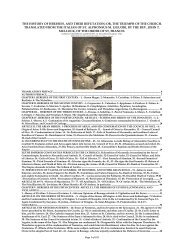The Writings of St. Francis of Assisi - + Saints' Works
The Writings of St. Francis of Assisi - + Saints' Works
The Writings of St. Francis of Assisi - + Saints' Works
You also want an ePaper? Increase the reach of your titles
YUMPU automatically turns print PDFs into web optimized ePapers that Google loves.
THE WRITINGS OF ST. FRANCIS OF ASSISI<br />
the Lord. 285 · Indeed the holy lent, which begins from Epiphany throughout the forty following<br />
days, which the Lord consecrated by His own holy fast (Mt 4:2), let those who voluntarily fast it<br />
be blest by the Lord, and let those who do not want (to do so) not be constrained. 286 · But let them<br />
fast the other (lent) 287 until the Resurrection <strong>of</strong> the Lord. · However at other times let them not be<br />
bound to fast, except on Fridays. 288 · Indeed in time <strong>of</strong> manifest necessity let the friars not be<br />
bound to the corporal fast. · Indeed, I counsel, warn and exhort my friars in the Lord Jesus<br />
Christ, that when they go about through the world, 289 they not quarrel nor contend in words (cf. 2<br />
Tim 2:14), nor judge others, · but be mild, peaceable and modest, meek and humble, speaking<br />
uprightly to all, as is fitting. · And that they ought not ride (horseback), 290 unless they are driven<br />
(to do so) by manifest necessity or infirmity. · "Into whatever house" they have entered, let them<br />
"first" say: "Peace to this house" (cf. Lk 10:5). · And according to the Holy Gospel let it be licit<br />
to eat <strong>of</strong> all the foods, which are placed before them (cf. Lk 10:8).<br />
Chapter IV<br />
That the brothers are not to receive money.<br />
I firmly precept 291 all 292 the friars, that in no manner are they to receive 293 coins 294 or<br />
285 This is the Fast <strong>of</strong> Advent (sometimes called "the fast <strong>of</strong> <strong>St</strong>. Martin"), a season <strong>of</strong> penance in<br />
preparation for Christmas. Like Eastern-Orthodox today, the Roman Church in the Middle Ages<br />
observed the season <strong>of</strong> Advent as lenten-penitential season. <strong>The</strong> Feast <strong>of</strong> All Saints occurs on<br />
November 1.<br />
286 In accord with the monastic traditions <strong>of</strong> the day, the first Rule had obliged fasting from<br />
Epiphany (January 6) to Easter, cf. RegNB III,11.<br />
287 i.e. the Lent which begins with Ash Wednesday. This fasting season is derived from the<br />
ancient penitential traditions <strong>of</strong> the Church, East and West, in preparation for the most sacred<br />
celebrations <strong>of</strong> Holy Week and Easter.<br />
288 Friday is the traditional day <strong>of</strong> fasting throughout Christendom, in memory <strong>of</strong> Christ's bloody<br />
Sacrifice on Golgotha..<br />
289 see fn. 145.<br />
290 lit. equitare, "to ride (horseback)" or any other animal, such as a mule or donkey. Christ and<br />
the Apostles had traveled throughout Judea by foot (cf. Lk 9:3-5). As in the days <strong>of</strong> Christ, the<br />
ownership or use <strong>of</strong> a pack-animal was a sign wealth and even status in the Middle Ages, cf.<br />
RegNB XV,1-2.<br />
291 see fn. 7. Christ, who condemned the love <strong>of</strong> money (Mt 6:24; Lk 16:13-15), had Himself<br />
forbidden His Apostles the use and reception <strong>of</strong> money during their preaching (Mt. 10:9; Lk.<br />
9:3); <strong>St</strong>. Peter and <strong>St</strong>. John continued this practice after the Resurrection (cf. Acts 3:6). <strong>The</strong><br />
Apostles also warned against the love <strong>of</strong> money (cf. Acts 8:20; 1 Tm 3:8; 6:9-10; Jm 5:2-3).<br />
292 lit. universis, each and every.<br />
293 <strong>The</strong> Latin word used here, recipere, "to receive" is to be distinguished from accipere "to<br />
accept;" the former signifies appropriation as a real act, whereas the latter signifies appropriation<br />
as a legal or moral act. Thus the Popes have explained the Rule <strong>of</strong> <strong>St</strong>. <strong>Francis</strong> as obliging not<br />
only the non-appropriation <strong>of</strong> money, but also the non-use <strong>of</strong> money. cf. Pope Nicholas III's bull<br />
Exiit qui seminat (Aug. 14, 1279 A.D.) n. 13, and Pope Clement V's bull Exivi de paradiso (May<br />
8, 1305 A.D.) n. 9.<br />
294 lit. denarios, the common silver coin <strong>of</strong> the day.<br />
Page - 77













